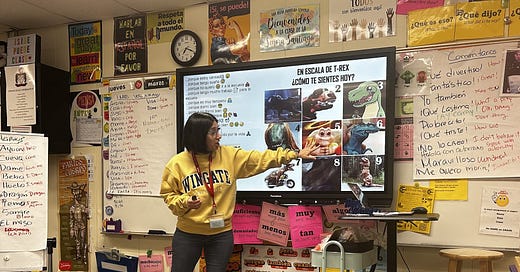Second Acts: A journalist becomes 'Señora Santiago'
Alexandra Santiago had found success as a Spanish-language reporter and editor, but something was missing — stability
Editor’s note: Are you curious about people who have taken bold steps to redefine their lives? This week, we’re introducing you to inspiring journeys of individuals who have embraced change, pivoted careers and pursued new passions — even later in life.
Journalism and education have more in common than you might think, says Alexandra Santiago, who at age 40 traded her reporter’s notebook for a grading pencil
Alexandra Santiago does a morning check-in with her Spanish II class at Northwest School of the Arts by asking them in Spanish: “On a T-Rex scale, how do you feel today?” (Photo courtesy of Alexandra Santiago)
by Cristina Bolling
It was the year 2015, and Alexandra Santiago had an enviable job as a Spanish-language journalist based in Charlotte.
She was a full-time freelancer for the international Spanish-language wire service Agencia EFE, filing daily stories out of North and South Carolina about issues facing the states’ Hispanic communities.
The native Venezuelan had dreamed about being a journalist since she was in middle school, and she’d proven herself, time and again, moving between high-production jobs at the South Florida Sun Sentinel where she covered the Miami City Council to being a reporter at Charlotte’s La Noticia newspaper and serving as editor of Que Pasa, another local Spanish-language media outlet, before becoming a regular contributor to Agencia EFE in 2006.
“I was constantly on deadline,” Santiago, 50, said. “Deadlines every day.”
But something was missing: stability.
She craved a job with benefits; a pension she could count on later in life, like her husband Miguel had earned working as a sergeant for Charlotte-Mecklenburg Police.
Throughout the years, she’d spent time covering Charlotte-Mecklenburg Schools as a reporter, and she was always drawn to kids from immigrant families. She knew how hard a struggle it was for parents to pass on a love of their native Spanish to the next generation. It was a struggle she, too, was going through as she raised her son, Miguelito.
And so, in 2015 at the age of 40, she decided to make a big change.
She put down her reporter’s notebook and picked up a school badge as a Spanish teacher at Northwest School of the Arts. Among her classes were ones for “heritage” speakers, or native Spanish speakers who spoke fluently at home but needed to learn to read and write.
Her first year teaching, she had 200 students in grades 9-12.
“It was like being thrown into the Roman Coliseum with the gladiators,” she laughs.
Keep reading with a 7-day free trial
Subscribe to The Charlotte Ledger to keep reading this post and get 7 days of free access to the full post archives.




